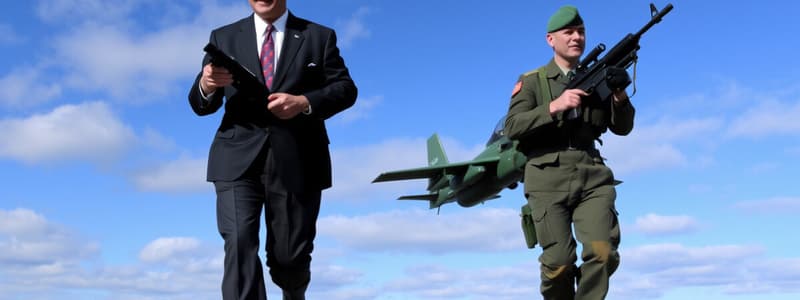Podcast
Questions and Answers
How did Kennedy alter defense spending in 1961?
How did Kennedy alter defense spending in 1961?
The defense budget was increased and placed on strategic armament and conventional forces.
What are conventional forces?
What are conventional forces?
These are forces capable of conducting operations using non-nuclear weapons.
What is strategic armament?
What is strategic armament?
This is when a country plans their military techniques.
What effect did Sputnik have on the arms race?
What effect did Sputnik have on the arms race?
What are ICBMs?
What are ICBMs?
How did misleading information regarding Soviet missiles affect US armament?
How did misleading information regarding Soviet missiles affect US armament?
What are SLBMs?
What are SLBMs?
What happened in Cuba in 1962?
What happened in Cuba in 1962?
What is Skybolt?
What is Skybolt?
What was McNamara's position?
What was McNamara's position?
What part of US defense did McNamara develop?
What part of US defense did McNamara develop?
What is mutual assured destruction (MAD)?
What is mutual assured destruction (MAD)?
What is damage limitation?
What is damage limitation?
What is counter force?
What is counter force?
What is counter city?
What is counter city?
Which needs to be more accurate and why: counterforce or countercity weapons?
Which needs to be more accurate and why: counterforce or countercity weapons?
What is flexible response?
What is flexible response?
How does flexible response differ from the 'new look'?
How does flexible response differ from the 'new look'?
How did Moscow feel about limited nuclear war?
How did Moscow feel about limited nuclear war?
Flashcards are hidden until you start studying
Study Notes
Kennedy and Defense Spending
- In 1961, defense spending increased under Kennedy, focusing on strategic armament and conventional forces.
Conventional Forces
- Conventional forces utilize non-nuclear weapons for military operations.
Strategic Armament
- Strategic armament involves planning and developing military techniques for defense.
Impact of Sputnik
- The USSR's launch of Sputnik heightened competition in the arms race, demonstrating Soviet technological superiority.
Intercontinental Ballistic Missiles (ICBMs)
- ICBMs are ballistic missiles capable of traveling across continents, significantly impacting military strategy.
Misleading Information on Soviet Missiles
- Inaccurate missile data led the US to base defense strategies on flawed information, impacting military preparedness.
Submarine-Launched Ballistic Missiles (SLBMs)
- SLBMs are ballistic missiles that can be launched from submarines, enhancing military capabilities.
Cuban Missile Crisis
- In 1962, the Cuban Missile Crisis escalated tensions, leading to rapid Soviet missile production to avoid nuclear inferiority.
Skybolt Missile Program
- The Douglas GAM-87 Skybolt was an air-launched ballistic missile developed in the late 1950s, later joined by the UK.
McNamara's Role
- Robert McNamara, the eighth Secretary of Defense, significantly influenced US military strategies during the 1960s, particularly in Vietnam.
Development of US Defense
- McNamara halted the B-70 bomber project due to skepticism regarding anti-ballistic missile effectiveness.
Mutual Assured Destruction (MAD)
- MAD doctrine emerged in the mid-1960s, centering on nuclear arsenals as a deterrent against total civilization destruction.
Damage Limitation
- Also known as crisis management, damage limitation aims to minimize harm during military conflicts.
Counter Force
- Counter force strategies target military installations or small operational areas.
Counter City
- Counter city strategies focus on attacks against civilian populations.
Accuracy in Warfare
- Accurate targeting is essential in both counterforce and countercity strategies to prevent escalation into mass destruction.
Flexible Response Strategy
- Kennedy's flexible response, implemented in 1961, allowed varied military responses to conflicts beyond just nuclear options.
Differences from "New Look"
- Unlike the "New Look" doctrine that emphasized nuclear deterrence, flexible response addressed multiple forms of aggression.
Moscow's View on Limited Nuclear War
- Moscow rejected the idea of limited nuclear warfare, believing it could undermine Western deterrence in case of Soviet aggression.
NATO and Flexible Response
- NATO adopted flexible response to enhance collective defense capabilities against various forms of aggression.
Studying That Suits You
Use AI to generate personalized quizzes and flashcards to suit your learning preferences.



